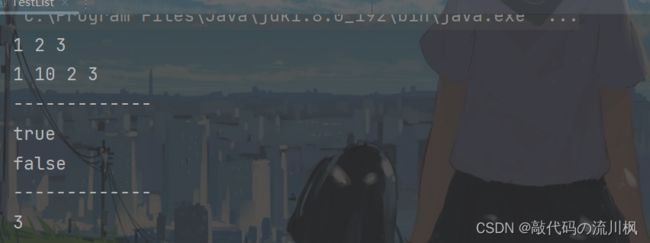Java数据结构——代码实现顺序表的操作
![]()
作者:敲代码の流川枫
博客主页:流川枫的博客
专栏:和我一起学java
语录:Stay hungry stay foolish
工欲善其事必先利其器,给大家介绍一款超牛的斩获大厂offer利器——牛客网
点击免费注册和我一起刷题吧
文章目录
顺序表
1.获取顺序表长度
2.打印顺序表中的所有元素
3.新增一个元素,默认在最后新增
4.在 pos 位置新增元素
5.判定是否包含某个元素
6.查找某个元素对应的位置
7.获取 pos 位置的元素
8.给 pos 位置的元素更新为 value
9.删除第一次出现的关键字key
10.清空顺序表
顺序表
顺序表是用一段物理地址连续的,存储单元依次存储数据的线性结构。是在数组上完成数据的增删查改
接下来我们自己实现一些接口对数组进行增删查改的操作
创建一个类:
public class MyArrayList {
public int[] elem;//数组
public int usedSize;//记录有效数据的个数
public static final int DEFAULT_SIZE = 10;
public MyArrayList(int[] elem){
this.elem = new int[DEFAULT_SIZE];
}1.获取顺序表长度
public int size() {
return this.usedSize;
}2.打印顺序表中的所有元素
public void disPlay(){
for (int i = 0; i < this.usedSize; i++) {
System.out.println(this.elem[i]+" ");
}
System.out.println();
}3.新增一个元素,默认在最后新增
步骤:检查当前顺序表是否满了;如果满了进行扩容;然后将元素放进去;usedSize++;
判满:
public boolean isFull(int[] elem){
if(size()>=this.usedSize){
return true;
}
else return false;
}扩容:
public void add(int data){
if(isFull()){
this.elem =
Arrays.copyOf(this.elem,2*this.elem.length);
}
//添加数据
this.elem[this.usedSize] = data;
//有效数据加一
this.usedSize++;
}测试:
public class TestList {
public static void main(String[] args) {
MyArrayList myArrayList = new MyArrayList();
myArrayList.add(1);
myArrayList.add(2);
myArrayList.add(3);
myArrayList.disPlay();
}
}
4.在 pos 位置新增元素
注意:负数下标不能当Pos;不能超过数组长度插入;不能间隔着插入,即插入的位置前面一定有元素;
还是先判断数组是否满,满了扩容;然后判断pos位置是否合法;不合法抛出异常;插入后将其他元素后移
public void add(int pos, int data) {
if(isFull()){
System.out.println("满了");
this.elem = Arrays.copyOf(this.elem,2*this.elem.length);
}
if(pos<0||pos>this.usedSize){
System.out.println("pos位置不合法");
throw new PosworongfulException("pos位置不合法");
}
//pos一定合法
// 挪动数据
for (int i = this.usedSize-1; i>=pos ; i--) {
this.elem[i+1] = this.elem[i];
}
//插入数据
this.elem[pos] = data;
//usedSize++
this.usedSize++;
}添加10到1位置
try {
myArrayList.add(1,10);
}
catch (PosworongfulException e){
e.printStackTrace();
}
myArrayList.disPlay();在10位置添加数据
try {
myArrayList.add(10,10);
}
catch (PosworongfulException e){
e.printStackTrace();
}
myArrayList.disPlay();5. 判定是否包含某个元素
public boolean contains(int toFind) {
for (int i = 0; i < this.size(); i++) {
if(elem[i]==toFind){
return true;
}
}
return false;
}
System.out.println("-------------");
System.out.println(myArrayList.contains(10));
System.out.println(myArrayList.contains(100));6.查找某个元素对应的位置
public int indexOf(int toFind) {
for (int i = 0; i < this.size(); i++) {
if(this.elem[i]==toFind){
return i;
}
}
return -1;
} System.out.println("-------------");
System.out.println(myArrayList.indexOf(3));7.获取 pos 位置的元素
//判断为空
public boolean isEmpty(){
return size()==0;
}
// 获取 pos 位置的元素
public int get(int pos) {
if(isEmpty()){
throw new EmptyException("当前顺序表为空");
}
if(pos<0||pos>=this.usedSize){
throw new PosworongfulException("pos位置不合法");
}
return this.elem[pos];
} System.out.println("------------");
System.out.println(myArrayList.get(0));
try {
myArrayList.get(10);
}catch (PosworongfulException e){
e.printStackTrace();
}8.给 pos 位置的元素更新为 value
public void set(int pos, int value) {
if(isEmpty()){
throw new EmptyException("顺序表为空");
}
if(pos<0||pos>=this.usedSize){
throw new PosworongfulException("pos位置不合法");
}
this.elem[pos] = value;
} System.out.println("---------");
myArrayList.set(0,100);
myArrayList.disPlay();9.删除第一次出现的关键字key
空表没有key
先找到key,找到下标
挪动数据
usedSize--
public void remove(int key) {
if(isEmpty()){
throw new EmptyException("顺序表为空");
}
int index = this.indexOf(key);
if(index==-1){
System.out.println("没有这个数字");
}
for (int i = index; i < size()-1; i++) {
this.elem[i] = this.elem[i+1];
}
this.usedSize--;
} System.out.println("---------");
myArrayList.remove(3);
myArrayList.disPlay();10.清空顺序表
此处顺序表元素不是引用类型,可直接将usedSize变为0来清空顺序表,如果是引用类型,则必须全部置空,否则会造成内存泄漏,空间无法回收
public void clear() {
this.usedSize = 0;
}
“ 本期的分享就到这里了, 记得给博主一个三连哈,你的支持是我创作的最大动力!
![]()








